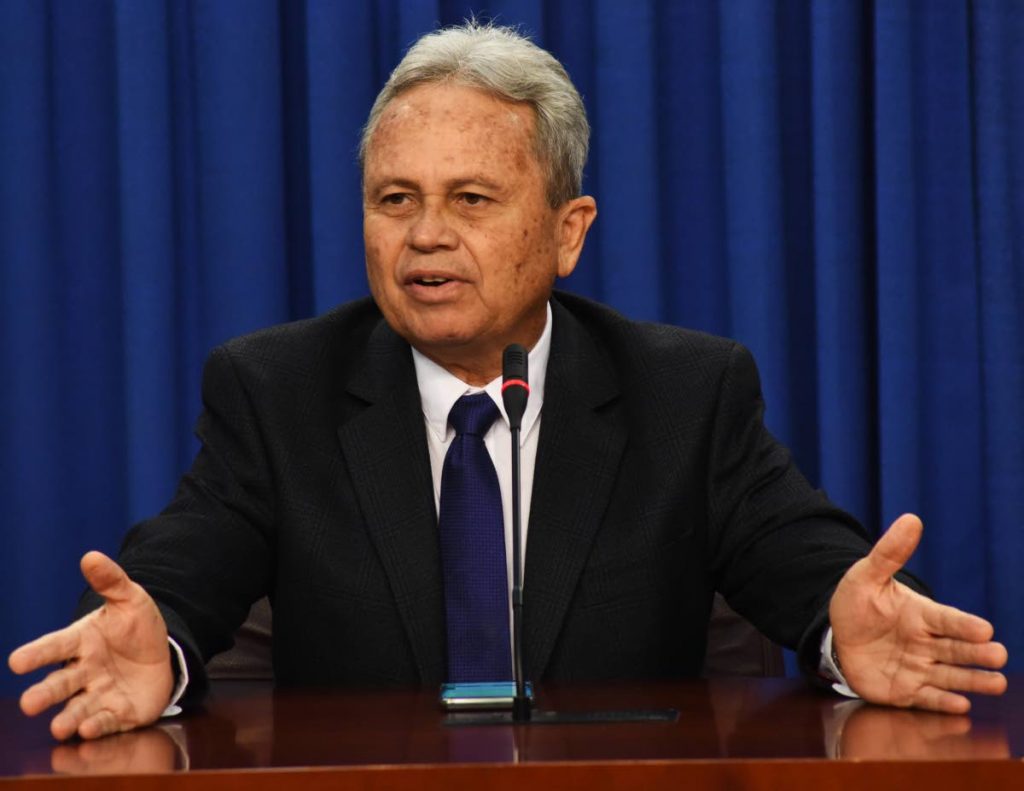Imbert: I'm no rubber stamp

Government is close to settling a disputed 56 per cent share ownership issue for Methanol Holdings (International) Ltd (MHIL) between Clico, which owns 49 per cent, and CL Financial (CLF), which is claiming seven per cent.
It is also reviewing offers for Clico from two insurance groups – Sagicor and Maritime.
Finance Minister Colm Imbert dealt with these major deals, during a press conference on Friday, saying he was "no rubber stamp" to push through decisions and had to protect the public interest.
In the case of MHIL – which has a total share value of $2.7 billion – Imbert said once the ownership is resolved, Government, as the primary creditor of Clico/CLF after a $23 billion bailout in 2009, can finally get around to either offering the shares for sale, or else, place them for offer in the second iteration of the National Investment Fund (NIF 2).
Speaking to the media at his office at the Eric Williams Financial Complex, Port of Spain, Imbert said it's a challenge Government has faced in settling the Clico debt. The shares are for an MHIL methanol company in the Middle East.
"Clico owns 56 per cent or so of that company but ownership of the 56 per cent was disputed. Forty-nine per cent was clearly owned by Colonial Life (Clico) and CLF had a claim to the other seven per cent. The submission of the claim by the liquidator (London-based financial advisory firm Grant Thornton) was to allow the seven per cent owned by CLF to be passed over to Clico for fair market value because there was an argument that there was a number of trust arrangements between the two companies that were not properly documented and in dispute," Imbert said.
One of the biggest jobs the liquidator has is to unravel those trust arrangements and determine if they are legal or not. "We decided to solve this problem by having Clico pay for the CLF shares and the funds would be placed in escrow pending the resolution. Now that Clico can get title to the 56 per cent, it can now initiate a process in the agreement between the Trinidad shareholders and the Middle Eastern shareholders (the Proman Group)," he said. The shareholders agreement says before those shares are sold or otherwise transferred, they must be offered to the next majority shareholder, which is Proman, Imbert said. If they decline to buy the shares, they can be sold but not to a competitor. "That's difficult because who would want methanol shares unless they are in the methanol business," Imbert said. It's complex, he said, but at least the liquidators have reached the point where they can make an offer to Proman and then taking it from there. If Proman declines to buy, then Government will offer the shares in the NIF 2 (National Investment Fund). That would reduce the debt owed by Clico to Government by $2.7 billion (the equivalent share value). If Proman decides to buy, Imbert said, Government would be just as happy with the cash.
With regards to the sale of Clico's traditional insurance portfolio, Imbert said that was under review. He said the portfolio had been offered to the local insurance industry but there was "a little glitch" where the company recommended as the best buyer had actually offered the lowest bid for the portfolio. Initially there were four companies that bid for the portfolio, but that eventually came down to two: Sagicor, the preferred bidder, and Maritime.
"As a minister I have to protect the public interest. The argument being made is the company that made the lower bid is a strong, substantial company and the risk of that company failing in the future is lower and the view is we should go with the lower bid because it is being assigned to a very stable local company.
"The other view is that the other company is not as stable as the first one and won't be able to manage the portfolio and there will be a higher risk to policyholders. The Central Bank (which has responsibility for the portfolio) is concerned about selling the portfolio to a company unable to manage it. I as minister have to be very careful. I have to protect the public interest and (get) maximum return for the country to make sure as much of that $23 billion that was put out (is recovered). I won't want to say any more except that no decision has been made by this ministry with respect to that matter," Imbert said.
No decision has been made by the Ministry of Finance, despite the recommendation by the Central Bank.
"There’s a mythology outside that the minister and the ministry have no role and we should just sit back and let everybody do whatever they want to do. That is not the case especially when shares in financial institutions are sold to foreign institutions. (There's) the question of competition and monopoly and what will happen in the market with a over-concentration of insurance or banking business (of) one particular company or conglomerate. So we in finance have to be very careful so even if we get recommendations from the Central Bank, my job is to protect the public interest. I am not a rubber stamp. I am very careful about what I do," Imbert said.


Comments
"Imbert: I'm no rubber stamp"